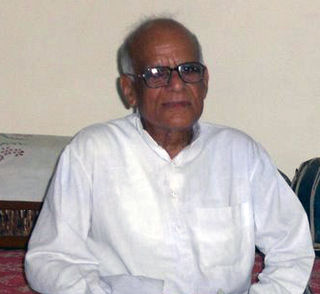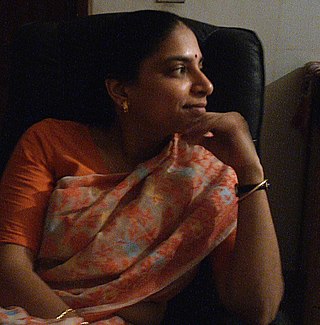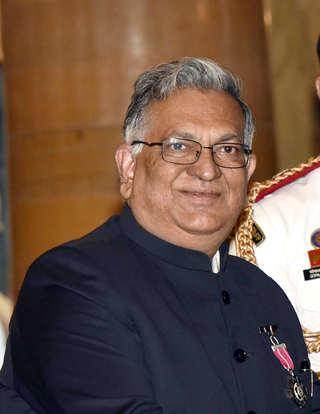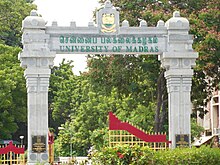
Indian Institute of Technology Kanpur is a public institute of technology located in Kanpur, Uttar Pradesh, India. It was declared an Institute of National Importance by the Government of India under the Institutes of Technology Act. IIT Kanpur is ranked among the most prestigious academic institutions in India.

Vinod K. Singh is a Rahula and Namita Gautam Chair Professor of Chemistry at IIT Kanpur. He is also the Director's Chair Professor at IISER Bhopal & adjunct Professor at NIPER Hyderabad. He is currently the President, Chemical Research Society of India and the Chairman, Governing Council of IACS Kolkata.

Man Singh Tyagi, better known as M. S. Tyagi, was a retired professor of Electrical Engineering form Indian Institute of Technology Kanpur.

Charusita Chakravarty was an Indian academic and scientist. She was a professor of chemistry at the Indian Institute of Technology, Delhi since 1999. In 2009 she was conferred Shanti Swarup Bhatnagar Prize for Science and Technology in the field of chemical science. In 1999, she received B.M. Birla Science Award. She was an Associate Member of the Centre for Computational Material Science, Jawaharlal Nehru Centre for Advanced Scientific Research, Bangalore.
Roop Mallik is an Indian biophysicist who works on nanoscale molecular motor proteins that transport material such as viruses, mitochondria, endosomes etc. inside living cells. The motors, such as kinesin and dynein generate forces of pico-newton order to carry our various cellular processes namely cell division, vesicular transport, endocytosis, molecular tethering etc. His lab is working to understand how motor proteins help in degradation and clearance of pathogens, and also how these motors work inside the liver to maintain systemic lipid homeostasis in the animal. Mallik is currently a professor at the Department of Biosciences and Bioengineering, Indian Institute of Technology Bombay.
Sandhya Srikant Visweswariah is a scientist and academic at the Indian Institute of Science, Bangalore, India. She is currently the Chairperson of the Department of Molecular Reproduction, Development and Genetics and the Co-chair of the Centre for Biosystems Science and Engineering, Indian Institute of Science. She additionally holds the position of Adjunct Professor, Faculty of Medicine and Dentistry, University of Bergen, Norway. Her research involves the investigation of the mechanism of signal transduction via cyclic nucleotides, phosphodiesterases and novel cyclases in bacteria. Most recently, she was awarded a Bill and Melinda Gates Grand Challenges Explorations Grant for her proposal entitled "A Small Animal Model of ETEC-Mediated Diarrhea".
Amalendu Chandra is an Indian theoretical physical chemist, a professor and the head of the Department of Chemistry at the Indian Institute of Technology, Kanpur. He is known for his microscopic theories and simulations on liquids, interface and clusters. He is an elected fellow of the Indian Academy of Sciences and the Indian National Science Academy. The Council of Scientific and Industrial Research, the apex agency of the Government of India for scientific research, awarded him the Shanti Swarup Bhatnagar Prize for Science and Technology, one of the highest Indian science awards, in 2007, for his contributions to chemical sciences.
Jarugu Narasimha Moorthy is an Indian organic photochemist and the director of Indian Institute of Science Education and Research, Thiruvananthapuram. He was a Dr. Jag Mohan Garg Chair Professor at the Indian Institute of Technology, Kanpur. He is known for his studies on organic photochemistry and supramolecular chemistry. He is an elected fellow of the Royal Society of Chemistry and the Indian Academy of Sciences. The Council of Scientific and Industrial Research, the apex agency of the Government of India for scientific research, awarded him the Shanti Swarup Bhatnagar Prize for Science and Technology, one of the highest Indian science awards, in 2008, for his contributions to chemical sciences.
Sandeep Verma is an Indian bioorganic chemist and chemical biologist, and a Professor in the Department of Chemistry at the Indian Institute of Technology, Kanpur (IITK). At IITK, he heads Sandeep Verma's Research Group in the areas of ordered peptide assemblies, metal-mediated nanoscale systems, programmable soft matter for neuronal regeneration, novel antimicrobials, and small molecule-stem cell modulation. He is an elected fellow of the Indian National Science Academy (INSA), the Indian Academy of Sciences, the National Academy of Sciences, India, and the Indian National Academy of Engineering. The Council of Scientific and Industrial Research, the apex agency of the Government of India for scientific research, awarded him the Shanti Swarup Bhatnagar Prize for Science and Technology, one of the highest Indian science awards, in 2010, for his contributions to Chemical Sciences.
Pradyut Ghosh is an Indian inorganic chemist and a professor at the Indian Association for the Cultivation of Science. He is known for his studies on chemical sensing of anions, interlocked molecules and self-assembly. He is a recipient of the Swarnajayanthi Fellowship of the Department of Science and Technology and the Bronze Medal of the Chemical Research Society of India. The Council of Scientific and Industrial Research, the apex agency of the Government of India for scientific research, awarded him the Shanti Swarup Bhatnagar Prize for Science and Technology, one of the highest Indian science awards, in 2015, for his contributions to chemical sciences.

Yogesh Moreshwar Joshi is an Indian chemical engineer, rheologist and the Pandit Girish & Sushma Rani Pathak Chair Professor at the Indian Institute of Technology, Kanpur. He is known for his studies on metastable soft matter and is an elected fellow of the Society of Rheology, Indian National Science Academy, Indian Academy of Sciences, and Indian National Academy of Engineering. In 2015, the Council of Scientific and Industrial Research, the apex agency of the Government of India for scientific research, awarded Joshi the Shanti Swarup Bhatnagar Prize for Science and Technology for his contributions to Engineering Sciences. In 2023, he received prestigious J C Bose fellowship constituted by the Science and Engineering Research Board, Government of India.
Nihar Ranjan Jana is an Indian neuroscientist and professor at the IIT Kharagpur, known for his studies on E3 ubiquitin ligases, protein homeostasis and neurodegenerative disorders. Jana is an elected fellow of the National Academy of Sciences, India. The Department of Biotechnology of the Government of India awarded him the National Bioscience Award for Career Development, in 2008 and TATA Innovation Fellowship in 2014 for his contributions to Neurodegenerative diseases.
Ramasubbu Sankararamakrishnan is an Indian computational biologist, bioinformatician and a professor at the Department of Biological Sciences and Bioengineering of the Indian Institute of Technology, Kanpur. He is known for his computational studies on membrane protein function. The Department of Biotechnology of the Government of India awarded him the National Bioscience Award for Career Development, one of the highest Indian science awards, for his contributions to biosciences in 2008.
Anuranjan Anand is a geneticist studying the cellular and molecular basis of human disorders. He is a professor at the Molecular Biology and Genetics Unit and an associate faculty at the Neuroscience Unit of Jawaharlal Nehru Centre for Advanced Scientific Research.
Balaji Prakash is an Indian structural biologist, biochemist and the Associate Dean of Sciences & Professor, Biological and Life Sciences, at the School of Arts and Sciences, Ahmedabad University, since July 2020. Prior to this he served as senior principal scientist and the head of the department of molecular nutrition of the Central Food Technological Research Institute. Known for elucidating the structure of a unique GTP-binding protein, Prakash is an elected fellow of the National Academy of Sciences, India and was a senior research fellow of The Wellcome Trust, UK. The Department of Biotechnology of the Government of India awarded him the National Bioscience Award for Career Development, one of the highest Indian science awards, for his contributions to biosciences, in 2009.
Arun Kumar Shukla is an Indian structural biologist and the Joy-Gill Chair professor at the department of biological sciences and bioengineering at the Indian Institute of Technology, Kanpur. Known for his studies on G protein-coupled receptor, Shukla is a Wellcome Trust-DBT Intermediate Fellow and a recipient of the SwarnaJayanti Fellowship of the Department of Science and Technology. The Department of Biotechnology of the Government of India awarded him the National Bioscience Award for Career Development, one of the highest Indian science awards, for his contributions to biosciences, in 2017/18. He received the 2021 Shanti Swarup Bhatnagar Prize for Science and Technology in Biological Science. He was awarded the Infosys Prize 2023 in Life Sciences his outstanding contributions to the biology of G-protein coupled receptors (GPCRs).
Suresh Kumar Rayala is an Indian cancer biologist and a professor at the department of biotechnology of the Indian Institute of Technology Madras. Known for his molecular and mechanistic studies of oncogenes and tumor suppressor genes, Rayala is a recipient of the Young Scientist Award of the Academy of Sciences, Chennai. The Department of Biotechnology of the Government of India awarded him the National Bioscience Award for Career Development, one of the highest Indian science awards, for his contributions to biosciences, in 2017–18.

Sudhir Kumar Jain is the incumbent and 28th Vice-Chancellor of Banaras Hindu University. He is a civil engineer by education and has formerly served three terms as the founding director of the Indian Institute of Technology Gandhinagar. He has carried out intensive research and development in the fields of seismic design codes, dynamic of buildings, and post-earthquake studies. Beside these, Jain has actively participated in teaching, research activities and development in earthquake engineering focused on developing countries. He is an elected fellow of Indian National Academy of Engineering. He was also elected a member of U.S. National Academy of Engineering (2021) for leadership in earthquake engineering in developing countries.
Rajat Moona is the Director of Indian Institute of Technology Gandhinagar from 2022 onwards. He is also serving as Director of Indian Institute of Information Technology, Vadodara on Additional Charge Basis from May 2023 onwards. He has served as director at Indian Institute of Technology, Bhilai from 2017 to 2022. He was also a professor of Computer Science and Engineering at IIT Kanpur from 1991 to 2011 and Director General of Centre for Development of Advanced Computing from 2009 to 2017.







